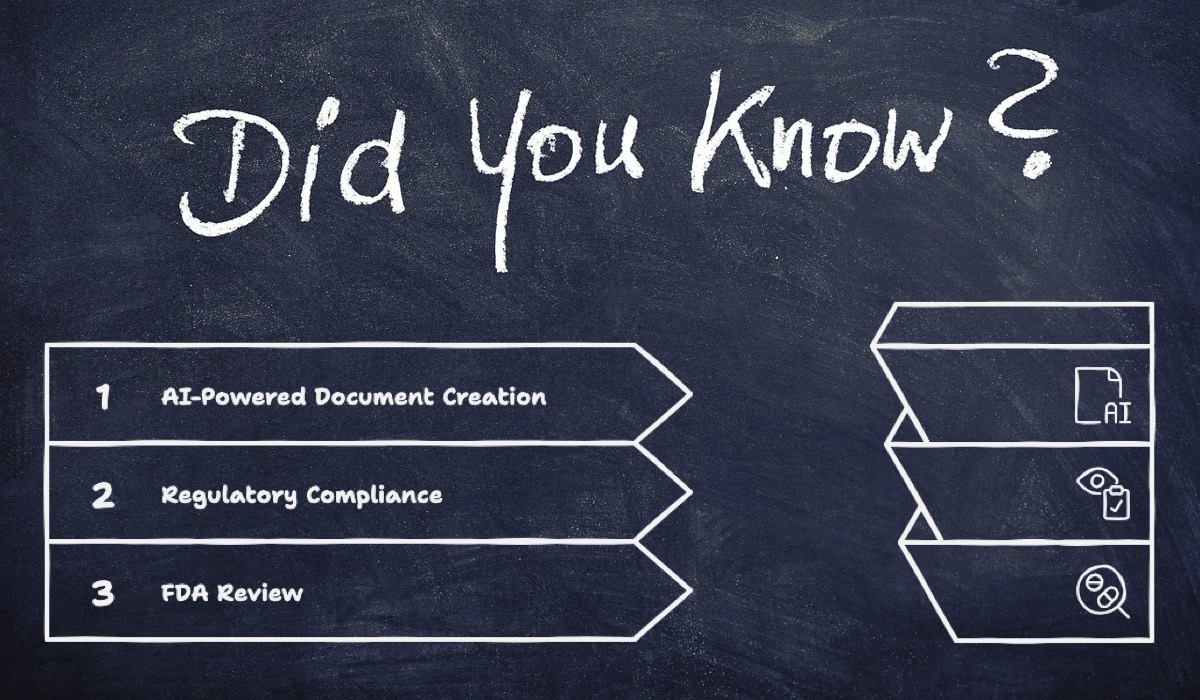AI Takes Center Stage at the FDA: A Game Changer for Accelerating Innovation and Public Health
Jun 04, 2025🚀 Revolutionizing Regulatory Writing with AI 🤖📄What if you could cut weeks off your submission timelines without compromising on quality or compliance? At AlphaLife Sciences, we're not just imagining it—we're building it. Discover how GenAI is transforming regulatory document creation with unmatched precision, speed, and control.The future of regulatory writing is here—and it's intelligent. 💡⚙️

In a significant move signaling the accelerating adoption of artificial intelligence in regulatory processes, the U.S. Food and Drug Administration (FDA) recently announced the launch of Elsa, a generative Artificial Intelligence (AI) tool designed to help employees work more efficiently. This initiative is a key step in modernizing agency functions and leveraging AI capabilities to better serve the American people.
This launch follows a "very successful pilot program with FDA’s scientific reviewers," according to FDA Commissioner Marty Makary, M.D., M.P.H.. Dr. Makary had previously announced an aggressive timeline to scale the use of AI internally across all FDA centers by June 30, 2025. He stated that the generative AI tools allow FDA scientists and subject-matter experts to spend less time on tedious, repetitive tasks that often slow down the review process. Echoing this sentiment, Jinzhong (Jin) Liu, Deputy Director, Office of Drug Evaluation Sciences, Office of New Drugs in FDA’s Center for Drug Evaluation and Research (CDER), remarked, “This is a game-changer technology that has enabled me to perform scientific review tasks in minutes that used to take three days”.
The agency-wide deployment of these capabilities holds tremendous promise in accelerating the review time for new therapies. Dr. Makary emphasized the urgency, stating, “There have been years of talk about AI capabilities in frameworks, conferences and panels but we cannot afford to keep talking. It is time to take action. The opportunity to reduce tasks that once took days to just minutes is too important to delay”. The rollout of Elsa was, in fact, achieved ahead of schedule and under budget, coordinated by the FDA's Chief AI Officer, Jeremy Walsh.
Elsa, a large language model–powered AI tool, is designed to assist with reading, writing, and summarizing. The FDA is already utilizing Elsa to accelerate clinical protocol reviews, shorten the time needed for scientific evaluations, and identify high-priority inspection targets. Specific examples of its use include summarizing adverse events to support safety profile assessments, performing faster label comparisons, and generating code to help develop databases for nonclinical applications.
This bold move by the FDA underscores the transformative potential of AI in life sciences, not just for regulatory bodies but also for the pharmaceutical industry itself. At AlphaLife Sciences, our flagship AuroraPrime platform is designed to provide pharma enterprises with a next-generation, cloud-native, unified GenAI-powered platform aimed at transforming pharma IT infrastructure. AuroraPrime focuses on fully automating document generation for R&D, regulatory, and post-market processes, thereby cutting time and reducing errors.
Just as the FDA is using AI to reduce busywork and accelerate reviews, AuroraPrime is built to streamline workflows and boost clinical lifecycle efficiency by seamlessly integrating medical authoring and data management. Our platform incorporates GenAI-powered solutions and features like AI Automation using Retrieval-Augmented Generation (RAG) and AI Agents, directly addressing the industry's need for faster, more accurate document creation that aligns with regulatory requirements.
AuroraPrime supports the generation of crucial documents such as Clinical Study Reports (CSRs), Clinical Protocols, Development Safety Update Reports (DSUR/PSUR), Lay Summaries, and Patient Narratives. Many of these are the very documents that the FDA's new AI tool, Elsa, will help review more efficiently. This synergy highlights the parallel advancements occurring within the industry and its regulating body, both driven by the power of AI to reduce manual effort and accelerate critical processes.
Furthermore, AuroraPrime’s Word Add-in, the RMA (Regulatory and Medical Authoring) Add-In, is purpose-built to enhance the creation of clinical documentation within the familiar Microsoft Word environment. It automates time-consuming tasks like incorporating Tables, Figures, and Listings (TFLs) and generating TFL summaries. This directly supports medical writers in producing high-quality clinical documentation more efficiently, potentially speeding up the creation of documents ready for FDA review.
The FDA's aggressive timeline for AI adoption and the successful launch of Elsa demonstrate a clear commitment to leveraging technology for greater efficiency and performance. This aligns perfectly with AlphaLife Sciences' mission to empower the life sciences industry through AI-driven automation. As the FDA steps into this new era of AI-assisted review, platforms like AuroraPrime are essential partners for pharmaceutical companies looking to optimize their R&D and regulatory processes, ensuring they are prepared for a future where AI is a cornerstone of accelerating medical innovation and protecting public health.





